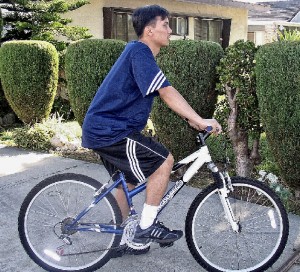“USE IT OR LOSE IT” IS A PRINCIPLE THAT APPLIES TO EVERY PART OF THE BODY. FROM THE BEGINNING, MAN WAS MADE TO BE PHYSICALLY ACTIVE. “THE LORD GOD TOOK THE MAN AND PUT HIM IN THE GARDEN OF EDEN TO WORK IT AND TAKE CARE OF IT.” GENESIS 2:15 IT SEEMS THAT AFTER MAN SINNED, THE NEED FOR EXERCISE, AND EXERCISE ITSELF GREW MORE INTENSE.“BY THE SWEAT OF YOUR BROW YOU WILL EAT YOUR FOOD. . . .” GENESIS 3:19
What Is Physical Exercise?
Physical Exercise is any activity of the body that improves or maintains physical fitness and overall health and wellness. It is done to strengthen muscles and the cardiovascular system, to lose weight and for enjoyment.
Classification of Physical Exercise
- Aerobic Exercise is any physical activity that uses large muscle groups and causes the body to use more oxygen than it normally does. Cycling, swimming, brisk walking, jumping rope, and hiking are some examples of aerobic exercise.
- Anaerobic Exercise or Resistance Training is a physical activity that firms, strengthens and tone muscles. It also improves strength, coordination and balance. Weight training, functional training and sprinting are some examples of anaerobic exercise.
- Flexibility Exercise (some call it strechercise) stretch and lengthen the muscles. Stretching help improve jointjoint flexibility and keeps muscles limber. The aim is to increase range of motion which can reduce injury.
Appropriate Physical Exercise done properly and consistently provides greater vitality, extra energy, and longer life. It is critically important to a total healthy lifestyle.
Excessive and/or inappropriate exercise is harmful. Without proper rest the risk of stroke or other circulatory problems increases.
Health Benefits of Exercise:
- Exercise helps one to reach and maintain proper body weight. It burns calories, builds muscle, and increases the metabolism.
- Exercise (done 40 minutes to one hour daily) stimulates the immune system.
- Exercise enhances circulation, which in turn improves memory and mental ability, and promotes better sleep and faster healing.
- Exercise strengthens the bones, helping them retain calcium and other minerals, thus aiding in the prevention of osteoporosis.
- Exercise (aerobic) helps protect from heart disease by strengthening the heart, decreasing blood pressure and heart rate, and lowering LDL (bad) cholesterol while raising HDL (good) cholesterol.
- Exercise aids digestion and promotes intestinal activity, reducing gas and constipation.
- Exercise releases endorphin, a hormone which gives that “good feeling” or a good mood. This is specially beneficial to depressed individuals.
EXERCISE ESSENTIALS
1. Check with your doctor before starting a vigorous exercise program if you have cardiovascular disease or are over 40 years old with multiple cardiovascular risk factors.
2. Make physical activity a part of your life: grow a garden; choose to walk rather than ride; always use the most distant parking space; take the stairs; play active games with kids; use a mower; walk the dog. In addition to these activities, choose an exercise that you will enjoy such as walking, swimming or cycling.
3. Establish an exercise routine. Pick a time of day that is best for you and keep that exercise appointment as if it were a business engagement.
4. Always start with a low intensity exercise to let your body warm up. Then do a few stretching exercises using a slow, steady movement.
5. End with a low intensity exercise to cool down, and more stretching to avoid soreness and enhance flexibility.
6. You need at least 40 minutes of exercise every day. If daily exercise is not possible, try for three times a week on nonconsecutive days.
7. Remember… you are not in competition with anyone, so don’t push beyond your tolerance. Excessive exercise is not healthy.
Two Important Things to Incorporate in Physical Exercise
- Deep Breathing. Do deep breathing before, during and after exercise. Deep breathing lessens or may totally eliminate the accumulation of lactic acid in the muscles during and after exercise. Accumulation of lactic acid in the muscles is the cause of soreness after a vigorous physical exercise.
- Drink Water. Drink water before, during and after exercise. This would prevent dehydration from occurring.
Lack of Physical Exercise would mean loss of muscle tone and loss of all the other health benefits that physical exercise brings. So USE IT (exercise) or LOSE IT (the health benefits)!


